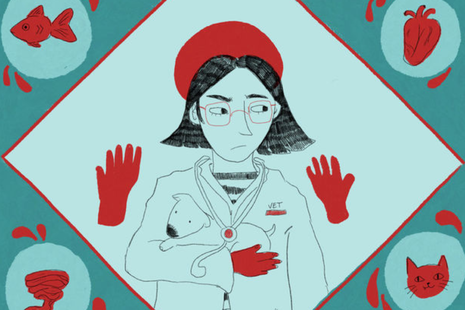Prosections and pigs: the practical side of Cambridge medicine
Ishaka De Bessou speaks to Cambridge medics and vet meds about the gruesome realities of their degrees

It’s dark, it’s snowing, and some vet meds are frantically Googling how to euthanize a fatally wounded lamb. Now, before you panic that the vet meds have gone rogue, it’s important that we’re aware of the very serious responsibilities involved in studying both human and veterinary medicine at Cambridge. As a warning, this article contains graphic details about students’ experiences.
As early as Michaelmas of first year, medics and vet meds are thrown right into the deep end with full-body dissections and farm placements. You may be thinking, “well obviously, they’re going to be doctors and vets.” This harrowing thought has crossed my mind – no more so than when I see a medic at Revs and question how in a few years they’ll be swapping VKs for vaccinations. But what’s most fascinating is the nonchalant way medics talk about their experiences. When I’d ask a medic about their day they’d use words like “cadaver” in a conversation as easily as I would the words “I’ve just come back from a lecture”.
“But what’s most fascinating is the nonchalant way medics talk about their experiences”
Life as a student can be difficult enough. I’ve always thought it can’t be made any easier with compulsory contact hours in the dissection room, or intensely physical placements on a farm. So, I decided to talk to some third-year medics and a third-year vet meds to learn about their practical experiences so far.
A vet med I spoke to recounted being on a farm placement during lambing season, with no staff members present, in the freezing cold and facing a difficult decision: what to do with an injured lamb that would not survive the night. Together with another student, in perhaps the most morbid and yet typically student response, the two of them Googled methods for putting the animal out of its misery. Thankfully, these internet searches didn’t flag on MI5’s systems and eventually, a staff member arrived to assist them. Despite this traumatic episode, this student greatly appreciated the opportunity of helping to deliver newborn lambs. No group of students take the term ‘hands-on experience’ more seriously than the medics.
However, this same vet med also recalled another, more unpleasant, farm placement: “What the hell are they gonna ask us to do next?”, this student wondered as they were instructed to thrash an unwanted piglet against a wall by its hind legs. There was no stun gun at the pig farm this student was on and so, alongside a fellow vet med, they were told to dispatch the “defected” piglets themselves. In a particularly repugnant statement, this vet med also recalled a staff member joking that the only value in having runts would be burning them as fuel.
“For instance, one medic told me that the dissected section of a cadaver had reminded them of a slice of pastrami”
As if this experience was not horrific enough, on a different occasion a piglet fell into the slurry pit beneath this vet med’s feet and they could see it passing underneath the floorboards, unable to breathe – to this student’s shock the farm’s staff members seemed unconcerned. Understandably, these students decided they’d had enough and cut their two week placement short after just four days on this farm. Though pig placements are hard to come by, these students decided that working in such abhorrent conditions wasn’t worth the emotional toll. Admittedly, very few vet meds will experience a placement this harrowing, but students are sometimes made to confront the harsh realities of profit-oriented farming. Cleaning the windows of a pet hotel on a subsequent placement was a “welcome respite” this vet med joked, even if this task had absolutely no medical application.
But of course, it’s not only the vet meds that have practical forms of teaching. Dissections and prosections (part of a cadaver that has previously been dissected by an expert) are part and parcel of being a medicine student at Cambridge.
For instance, one medic told me that the dissected section of a cadaver had reminded them of a slice of pastrami. She also described how a cadaver’s limbs flailed as the body was turned over on its back, revealing a different facial expression from before that was fixed into place – as if it had been pressed against glass. I’ll admit, at this point, I was unnerved, but this student remained calm and relaxed in sharing their early memories of studying medicine. This isn’t to say I was chatting to a sociopath. Instead, this student recognised that dissections were a vital component of her course and had greatly appreciated this level of medical insight.
“It smells a bit like brie.” This is how another medic described the dissection room to me. Cadavers and cheese seemed an unusual pairing. I spoke to another medic who told me that the embalming chemicals used to preserve the cadavers induced a state of hunger. There he was, stood in a room full of deceased individuals, with a rumbling stomach.
“One of the students I spoke to, who had decided to change from medicine to a different degree, said that they faced a future where they’d ‘graduate and join the picket line’”
A gall bladder that had burst, a bile duct that had leaked, tumours inside a cadaver that had suffered from late pulmonary cancer: these were all examples of things medics had seen, dissected, and learned from. It’s difficult to imagine a student cycling down to a nondescript building and then seeing that sort of imagery on a drizzly Thursday morning, but such are the requirements of medicine. What amazed me was the curiosity and enthusiasm of these medics, who maintained that practical opportunities to learn about the body and deduce what issues it had been grappling with were invaluable. Applying something taught in a lecture to a real-world setting was one of their favourite parts of studying medicine. As one student remarked to me, “even muscles don’t do exactly what the textbooks say they do.” Shazia Absar’s article puts it best: the bodies examined in the dissection room are the first ever “patients” these future doctors will encounter.
Admittedly, I couldn’t conduct an exhaustive investigation of the individual experiences of all medical students and it’s important to note that people’s experiences vary. I’ve heard of some who have left the dissection room because they’ve found it overwhelming, a reaction with which we can all sympathise. Even students who were not visibly shaken by these practical experiences acknowledged that eventually learning the names of the bodies they’d dissected, and later attending commemorative ceremonies in their honour, were especially poignant moments.
However insightful, the heuristic experiences of medics and vet meds exist against a backdrop of additional burdens. One of the students I spoke to, who had decided to change from medicine to a different degree, said that they faced a future where they’d “graduate and join the picket line”.
Vet meds also face difficulties in terms of the structure of their placements. Unlike medics, their practical modules take place outside of term and students are expected to organise these placements themselves. The lack of safeguards in place can mean that students stay in locations with relative strangers, in unfamiliar environments, and sometimes without other students.
This is not to say that medical students should begin a mass exodus, or that every practical experience they have over their first three years of study is utterly dreadful, but it highlights that medics and vet meds are under a unique pressure that deserves more attention. Many of us can attest to having had a rough day, but few of us can understand the experience of being surrounded by the extremes of life and death so soon after Freshers’ Week ends.
All degrees at Cambridge are so wonderfully unique and sometimes academic life here is so hectic that we don’t often get the time to think about what our friends and roommates get up to in their day. So if you’re currently living with a first-year vet med and they’ve come back from the Easter break feeling emotionally spent, or you know a second-year medic who looks a little shaken, just give them that nod Michael Caine gives Christian Bale at the end of The Dark Knight Rises. As if to convey, in some microscopic way, that you have just an inkling of what they’ve come back from.
 News / Judge Business School advisor resigns over Epstein and Andrew links18 February 2026
News / Judge Business School advisor resigns over Epstein and Andrew links18 February 2026 News / Hundreds of Cambridge academics demand vote on fate of vet course20 February 2026
News / Hundreds of Cambridge academics demand vote on fate of vet course20 February 2026 News / CUCA members attend Reform rally in London20 February 2026
News / CUCA members attend Reform rally in London20 February 2026 News / Petition demands University reverse decision on vegan menu20 February 2026
News / Petition demands University reverse decision on vegan menu20 February 2026 News / Gov grants £36m to Cambridge supercomputer17 February 2026
News / Gov grants £36m to Cambridge supercomputer17 February 2026










